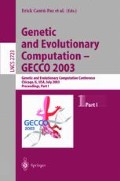Abstract
One problem associated with coevolutionary algorithms is that of forgetting, where one or more previously acquired traits are lost only to be needed later. We introduce a new coevolutionary memory mechanism to help prevent forgetting that is built upon game-theoretic principles, specifically Nash equilibrium. This “Nash memory” mechanism has the following properties: 1) It accumulates a collection of salient traits discovered by search, and represents this collection as a mixed strategy. 2) This mixed strategy monotonically approaches the quality of a Nash equilibrium strategy as search progresses, thus acting as a “ratchet” mechanism. 3) The memory naturally embodies the result (solution) obtained by the coevolutionary process. 4) The memory appropriately handles intransitive cycles (subject to resource limitations). We demonstrate our Nash memory using Watson and Pollack’s intransitive numbers game, and compare its performance to the conventional “Hall of Fame” memory and the more recently proposed Dominance Tournament.
Access this chapter
Tax calculation will be finalised at checkout
Purchases are for personal use only
Preview
Unable to display preview. Download preview PDF.
References
R. Brooks and P. Maes, editors. Proc. 4th Conf. on Artif. Life. MIT Press, 1994.
D. Cliff and G. F. Miller. Tracking the red queen: Measurments of adaptive progress in co-evolutionary simulations. In F. Moran et al., editors, 3rd Euro. Conf. on Artificial Life, pages 200–218. Springer Verlag, 1995.
S. G. Ficici, O. Melnik, and J. B. Pollack. A game-theoretic investigation of selection methods used in evolutionary algorithms. In A. Zalzala et al., editors, Proc. of 2000 Congress on Evolutionary Computation, pages 880–887. IEEE Press, 2000.
S. G. Ficici and J. B. Pollack. Challenges in coevolutionary learning: Arms-race dynamics, open-endedness, and mediocre stable states. In C. Adami et al., editors, Proc. of the Sixth Conf. on Artificial Life, pages 238–247. MIT Press, 1998.
D. Fudenberg and J. Tirole. Game Theory. MIT Press, 1998.
D. Goldberg. Genetic Algorithms in Search, Optimization, and Machine Learning. Addison Wesley, 1989.
S. Nolfi and D. Floreano. Co-evolving predator and prey robots: Do ‘arm races’ arise in artificial evolution? Artificial Life, 4(4):311–335, 1998.
C. W. Reynolds. Competition, coevolution and the game of tag. In P. Maes, editors. Proc. 4th Conf. on Artif. Life. MIT Press, 1994 Brooks and Maes [1], pages 59–69.
C. Rosin and R. Belew. New methods for competitive co-evolution. Evolutionary Computation, 5(1):1–29, 1997.
K. Sims. Evolving 3d morphology and behavior by competition. In P. Maes, editors. Proc. 4th Conf. on Artif. Life. MIT Press, 1994 Brooks and Maes [1], pages 28–39.
K. O. Stanley and R. Miikkulainen. The dominance tournament method of monitoring progress in coevolution. In A. Barry, editor, 2002 Genetic and Evolutionary Computation Conference Workshop Program, pages 242–248, 2002.
P. R. Thie. An Introduction to Linear Programming and Game Theory. John Wiley and Sons, 1988.
R. A. Watson and J. B. Pollack. Coevolutionary dynamics in a minimal substrate. In L. Spector et al., editors, Proc. 2001 Genetic and Evolutionary Computation Conf., pages 702–709. Morgan Kaufmann, 2001.
Author information
Authors and Affiliations
Editor information
Editors and Affiliations
Rights and permissions
Copyright information
© 2003 Springer-Verlag Berlin Heidelberg
About this paper
Cite this paper
Ficici, S.G., Pollack, J.B. (2003). A Game-Theoretic Memory Mechanism for Coevolution. In: Cantú-Paz, E., et al. Genetic and Evolutionary Computation — GECCO 2003. GECCO 2003. Lecture Notes in Computer Science, vol 2723. Springer, Berlin, Heidelberg. https://doi.org/10.1007/3-540-45105-6_35
Download citation
DOI: https://doi.org/10.1007/3-540-45105-6_35
Published:
Publisher Name: Springer, Berlin, Heidelberg
Print ISBN: 978-3-540-40602-0
Online ISBN: 978-3-540-45105-1
eBook Packages: Springer Book Archive

